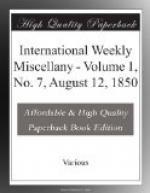That a chief secretary so circumstanced, struggling to sustain extreme Orangeism in its dying agonies, should have been called upon to encounter great toil and anxiety is a truth too obvious to need illustration. That in these straits Mr. Peel acquitted himself with infinite address was as readily acknowledged at that time as it has ever been even in the zenith of his fame. He held office in that country under three successive viceroys, the Duke of Richmond, Earl Whitworth, and Earl Talbot, all of whom have long since passed away from this life, their names and their deeds long forgotten. But the history of their chief secretary happens not to have been composed of such perishable materials, and we now approach one of the most memorable passages of his eventful career. He was chairman of the great bullion committee; but before he engaged in that stupendous task he had resigned the chief secretaryship of Ireland. As a consequence of the report of that committee, he took charge of and introduced the bill for authorizing a return to cash payments which bears his name, and which measure received the sanction of parliament in the year 1819. That measure brought upon Mr. Peel no slight or temporary odium. The first Sir Robert Peel was then alive, and altogether differed from his son as to the tendency of his measure. It was roundly asserted at the time, and very faintly denied, that it rendered that gentleman a more wealthy man, by something like half a million sterling, than he had previously been. The deceased statesman, however, must, in common justice, be acquitted of any sinister purpose.
This narrative now reaches the year 1820, when we have to relate the only domestic event in the history of Sir Robert Peel which requires notice. On the 8th of June, being then in the 33d year of his age, he married Julia, daughter of General Sir John Floyd, who had then attained the age of 25.
Two years afterward there was a lull in public affairs, which gave somewhat the appearance of tranquillity. Lord Sidmouth was growing old, he thought that his system was successful, and that at length he might find repose. He considered it then consistent with his public duty to consign to younger and stronger hands the seals of the home department. He accepted a seat in the cabinet without office, and continued to give his support to Lord Liverpool, his ancient political chief. In permitting his mantle to fall upon Mr. Peel, he thought he was assisting to invest with authority one whose views and policy were as narrow as his own, and whose practise in carrying them out would be not less rigid and uncompromising. But, like many others, he lived long enough to be grievously disappointed by the subsequent career of him whom the liberal party have since called “the great minister of progress,” and whom their opponents have not scrupled to designate by appellations not to be repeated in these hours of sorrow and bereavement. On the 17th of January, 1822, Mr. Peel was installed




